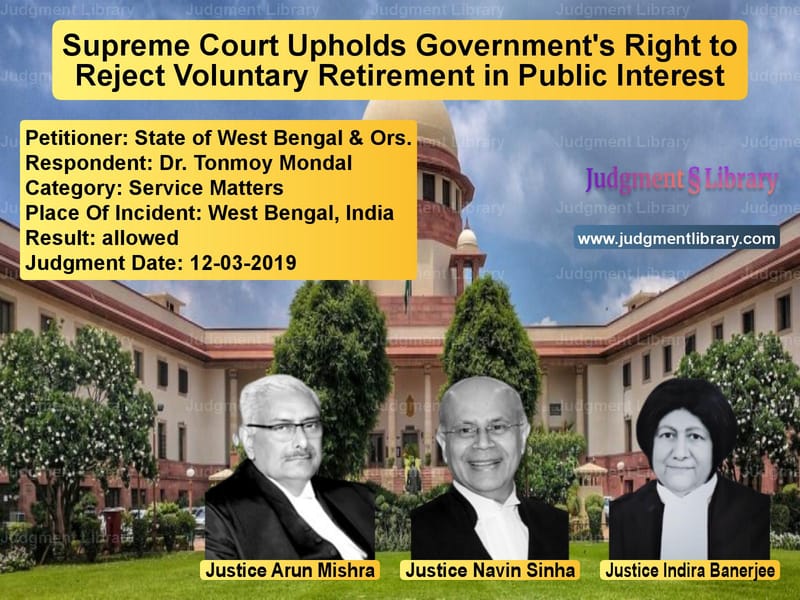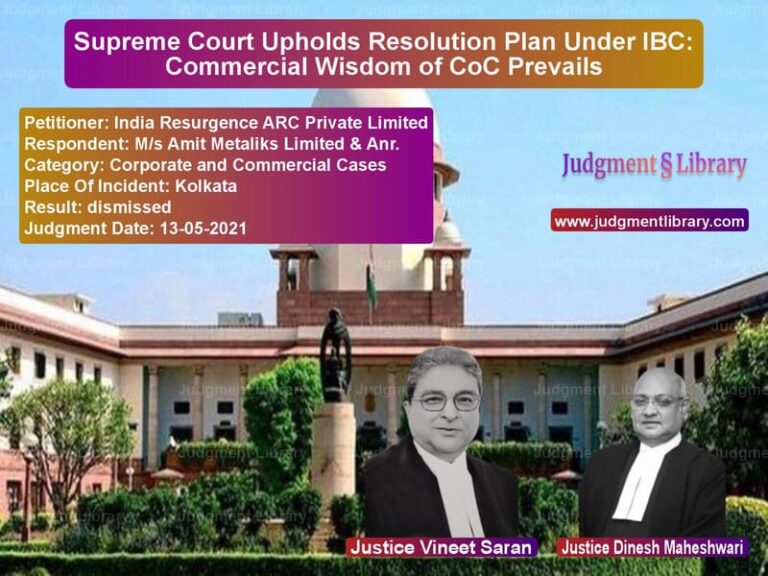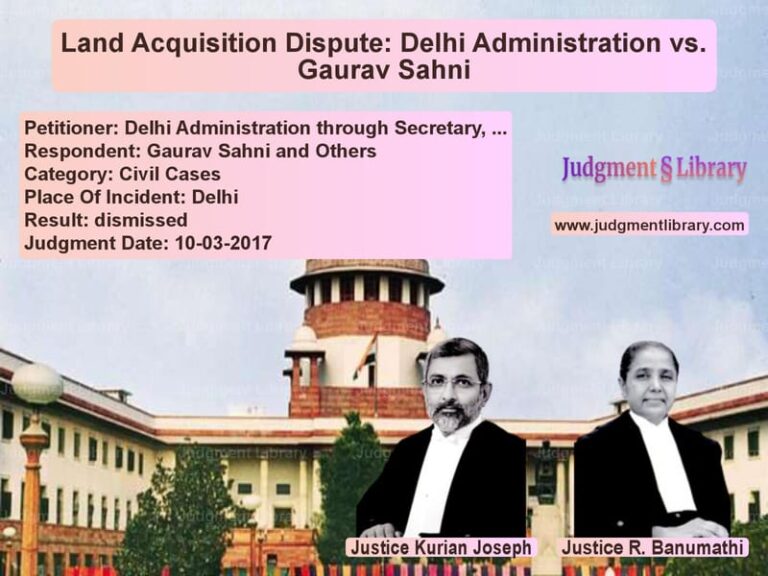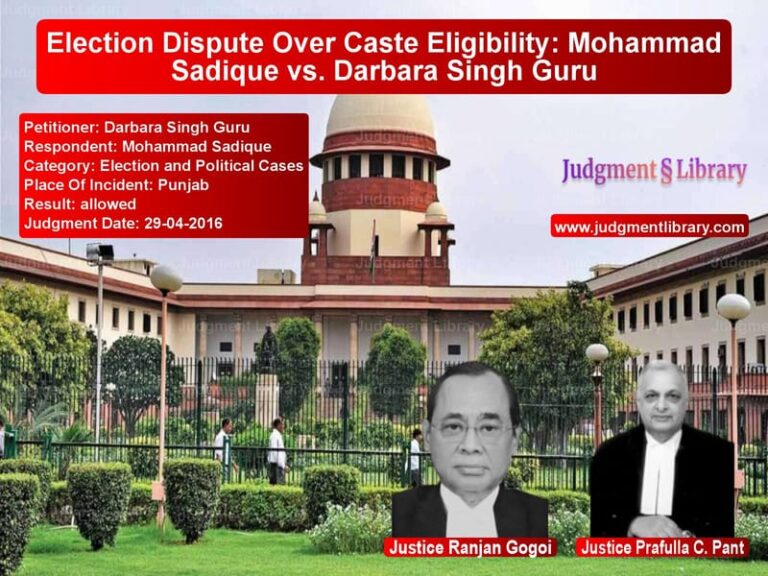Supreme Court Upholds Government’s Right to Reject Voluntary Retirement in Public Interest
The case of State of West Bengal & Ors. vs. Dr. Tonmoy Mondal revolves around the interpretation of Rule 75 of the West Bengal Service Rules, 1971 and whether a government doctor can claim an absolute right to voluntary retirement. The Supreme Court ruled that the State has the discretion to deny voluntary retirement in the interest of public service.
Background of the Case
The respondent, Dr. Tonmoy Mondal, joined the West Bengal Health Services as a Medical Officer on October 20, 1986, initially on an ad hoc basis. He was confirmed in service on November 15, 2002. On November 16, 2011, he sought voluntary retirement. However, the State Government rejected his request on February 22, 2013, citing public interest as the primary reason.
The rejection order stated:
“At this stage, the Health & Family Welfare Department is having many vacancies, and it is necessary to retain doctors to provide service to people.”
Dissatisfied with the rejection, Dr. Mondal challenged the order before the West Bengal Administrative Tribunal, which ruled in his favor and quashed the government’s order. The State of West Bengal subsequently filed a writ petition before the Calcutta High Court.
High Court Decision
The Division Bench of the High Court initially upheld the government’s decision, reasoning that voluntary retirement is not an absolute right and is subject to public interest considerations under Rule 75 (aaa) of the West Bengal Service Rules. However, Dr. Mondal filed a review petition, and in 2017, the High Court reversed its previous ruling, holding that the rejection of voluntary retirement was unjustified.
The State of West Bengal then appealed to the Supreme Court, seeking to overturn the High Court’s decision.
Legal Issues Before the Supreme Court
The key legal questions in this case were:
- Whether the government has the right to reject voluntary retirement based on public interest.
- Whether the High Court exceeded its jurisdiction by reviewing and reversing its earlier decision.
- Whether Rule 75 (aaa) grants an absolute right to voluntary retirement.
Arguments by the Petitioner (State of West Bengal & Ors.)
- The State contended that under Rule 75 (aaa), voluntary retirement is not an absolute right and can be rejected in public interest.
- They cited a severe shortage of doctors in government hospitals and argued that accepting Dr. Mondal’s request would set a precedent allowing crucial government employees to leave service at will, disrupting public healthcare.
- The High Court’s review decision was unjustified, as the first ruling had correctly upheld the government’s discretion under the law.
Arguments by the Respondent (Dr. Tonmoy Mondal)
- Dr. Mondal argued that he had completed his required service period and was entitled to retire voluntarily under Rule 75 (aaa).
- The government’s claim of public interest was arbitrary and lacked a legal basis.
- The government had allowed other doctors to retire voluntarily, and rejecting his request was discriminatory.
- He had a fundamental right under Article 19(1)(g) of the Constitution to choose his profession and retire if he wished.
Supreme Court’s Analysis and Judgment
The Supreme Court analyzed Rule 75 and found that voluntary retirement is subject to approval by the government in certain circumstances. The Court made the following key observations:
- “The concept of liberty not to serve when the public interest requires cannot be attracted, as retirement which carries pecuniary benefits can be subject to certain riders.”
- “The general public has the right to obtain treatment from skilled specialists. A shortage of doctors in government hospitals justifies the rejection of voluntary retirement applications.”
- “Voluntary retirement cannot be equated with resignation. It is subject to public interest considerations and cannot be claimed as an absolute right.”
- “The High Court’s review decision was erroneous, as it failed to recognize that public interest must be prioritized in cases involving essential services like healthcare.”
Final Judgment
The Supreme Court ruled as follows:
- The High Court’s review decision was set aside, and the original order rejecting Dr. Mondal’s voluntary retirement was restored.
- Dr. Mondal was directed to report back to duty within one month.
- He would not be entitled to wages for the period he was absent from service.
- His period of absence would also not be counted for retirement benefits.
Significance of the Judgment
This ruling establishes critical legal principles regarding voluntary retirement:
- Government employees, especially in essential services, cannot claim voluntary retirement as an absolute right.
- Public interest considerations take precedence over individual retirement decisions.
- Judicial review of administrative decisions should be limited to cases of arbitrariness or mala fide intent.
- Government policies on voluntary retirement must be applied uniformly to avoid discrimination.
Conclusion
The Supreme Court’s decision in State of West Bengal & Ors. vs. Dr. Tonmoy Mondal reinforces the government’s authority to regulate voluntary retirement in the public interest. It ensures that crucial public services, such as healthcare, are not disrupted due to mass resignations. The ruling also sets a precedent for similar cases involving voluntary retirement in other essential sectors.
Petitioner Name: State of West Bengal & Ors..Respondent Name: Dr. Tonmoy Mondal.Judgment By: Justice Arun Mishra, Justice Navin Sinha, Justice Indira Banerjee.Place Of Incident: West Bengal, India.Judgment Date: 12-03-2019.
Don’t miss out on the full details! Download the complete judgment in PDF format below and gain valuable insights instantly!
Download Judgment: State of West Bengal vs Dr. Tonmoy Mondal Supreme Court of India Judgment Dated 12-03-2019.pdf
Direct Downlaod Judgment: Direct downlaod this Judgment
See all petitions in Public Sector Employees
See all petitions in Disciplinary Proceedings
See all petitions in Employment Disputes
See all petitions in Judgment by Arun Mishra
See all petitions in Judgment by Navin Sinha
See all petitions in Judgment by Indira Banerjee
See all petitions in allowed
See all petitions in supreme court of India judgments March 2019
See all petitions in 2019 judgments
See all posts in Service Matters Category
See all allowed petitions in Service Matters Category
See all Dismissed petitions in Service Matters Category
See all partially allowed petitions in Service Matters Category







